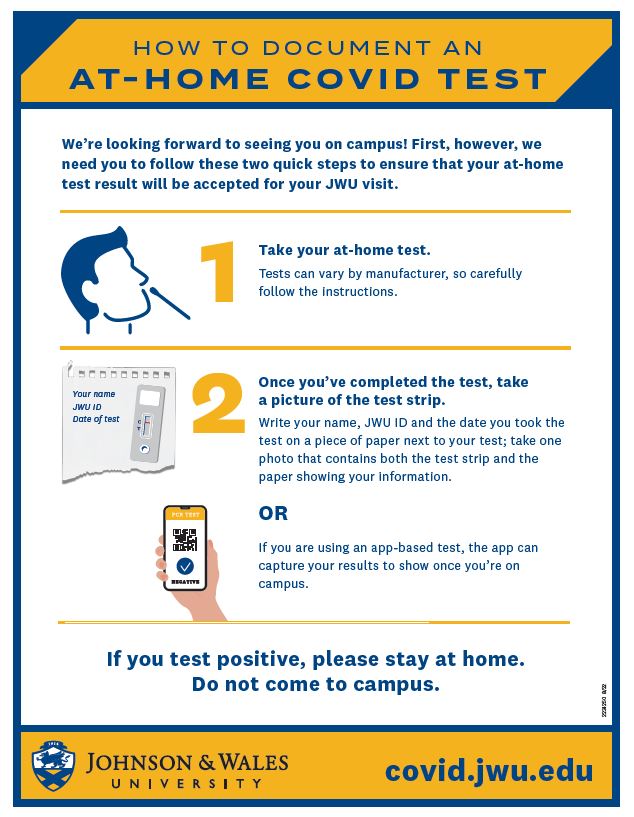
Information For Me
Health & Safety
Johnson & Wales University remains committed to mitigating the risks of COVID-19 and maintaining a positive campus community and online environment for living, learning and working.
Support The Overall Well-being of JWU Campuses
All JWU community members must follow these guidelines each and every day.
COVID-19 Updates By Campus
“We have found many creative and fun ways to stay connected and engaged ... Let’s do our part to keep our campuses open and keep each other safe.”
- Chancellor Mim L. Runey, LP.D.

Universitywide FAQs
The university is recommending but not requiring COVID-19 shots for students, faculty, & staff. The university continues to follow state guidance in terms of mask-wearing. Students who test positive throughout the academic year will be instructed to isolate in place and to mask for an additional five days after isolation has ended. Masking is not required on campus but is a great way to reduce the transmission of all viruses; masks will still be required in Health Services offices if you have any respiratory or GI complaint, and/or at the discretion of the provider or nurse.
Mask-wearing, regardless of an individual’s vaccination status, is optional on our campus and no longer required inside or outside buildings. Please be advised that anyone who feels more comfortable wearing a mask (a KN95 mask is recommended) on campus is supported in doing so. We also encourage all students, faculty and staff to continue carrying masks on them. Please note: the university still requires masks in Health Services offices if you have any respiratory or GI complaint, and/or at the discretion of the provider or nurse.
You can.
Once you've taken an at-home test, here's what you should do:
- Take a picture of the test strip.
- If there is room on your test strip, write your name and the date you took the test on it.
- If there isn’t room on the test strip, write just the date you took the test on the test strip. Then write your name on a piece of paper and take a picture of both the test strip and the paper with your information on it in one photo.
- Submit your photo to Health Services via the Medicat Portal
- Go to jwu.medicatconnect.com > Uploads > Select the photo of your test and information > 2019 Novel Coronavirus > Upload
If you are a student on the Providence Campus and your result is positive, call Health Services at 401-598-1104 or 401-598-1151. Health Services will instruct you on quarantine/isolation guidelines and assist you with any questions you may have. Positive or negative, you should also submit your result to the Rhode Island Department of Health by going to https://portal.ri.gov/gettested/s/selftest?language=en_US and filling out the required fields.
If you are a student on the Charlotte Campus and your result is positive, email Health Services (hcs.clt@jwu.edu) with your best contact information and any information about symptoms, course of illness, and contacts. Health Services will contact you by phone to provide instructions on quarantine/isolation guidelines and assist you with any questions you may have.
*This does not apply to JWU employees (faculty and staff) who are unvaccinated. They must continue to be tested on-campus or in another monitored testing situation.

Once you have your test results from either a medical provider or testing site (or an at-home test), you should:
- Submit a photo of those results to Health Services via the Medicat Portal
- Go to jwu.medicatconnect.com > Uploads > Select the photo of your test and information > 2019 Novel Coronavirus > Upload
At this time, the Centers for Disease Control and Prevention (CDC) maintains that vaccines are still the best public health measure to protect people from COVID-19, slow transmission, and reduce the likelihood of new variants emerging. Right now, about 95 percent of our Providence campus population is fully vaccinated. Boosters are still an important part of this process and are strongly encouraged as you are eligible for them.
Students are required to upload their medical records of their COVID-19 vaccination into the Medicat Student Patient Portal. The university will not accept student vaccination records via email.
To upload medical records verifying COVID-19 vaccinations, visit jwu.medicatconnect.com and follow these steps:
- Enter your JWU log in
- Once the portal is open, click Upload
- Select 2019 Novel Coronavirus (Covid 19), NAA (Third Party) from the drop down menu
- To upload take a photo or screenshot of your vaccination card with your phone, email that to yourself, open your email up on your computer, then you can drag/drop or browse for the file that you would then upload to the portal.
Faculty and staff are required to provide Human Resources with a copy of their vaccination card.
Anyone who has been granted an exemption from this requirement for medical or religious reasons will continue to be required to go through sentinel testing.